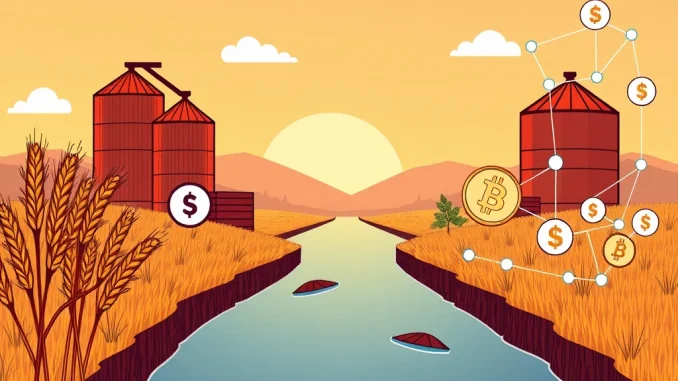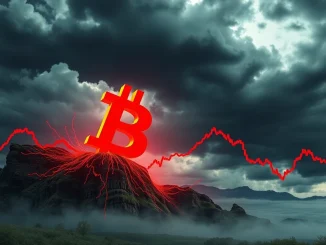
Get ready for a potentially game-changing development in international trade! Russia is actively exploring the use of Russia crypto payments as an alternative settlement method for its massive grain exports. This move comes directly in response to ongoing Western sanctions and could signal a significant shift in how global commodity markets operate.
Why is Russia Considering Crypto for Grain Exports?
The primary driver behind Russia’s interest in crypto for settling grain exports is undoubtedly the extensive sanctions imposed by the EU and the U.S. These sanctions have complicated access to traditional international banking systems, including SWIFT, making it harder for Russia to receive payments for its exports in currencies like USD or EUR.
By turning to cryptocurrency, Russia aims to:
- Bypass traditional financial channels affected by sanctions.
- Find new ways to receive payments from international buyers.
- Reduce reliance on the U.S. dollar and euro in trade.
According to a report from Bitcoin.com, Russia’s Agricultural Bank is specifically looking into this possibility. Given Russia’s position as a major global supplier, particularly of wheat, finding reliable payment methods is crucial for its economy and for maintaining stability in the international food market.
How Could Crypto Facilitate Agricultural Trade?
Using crypto for agricultural trade payments isn’t as simple as sending Bitcoin back and forth (though that’s technically possible). More likely scenarios involve stablecoins or other digital assets designed for faster, cheaper, and potentially less regulated international transfers. Here’s a breakdown of how it might work:
Buyers in other countries could potentially settle transactions for Russian grain using a mutually agreed-upon cryptocurrency. This transaction would occur on a blockchain network, bypassing traditional banks and payment processors that might be hesitant or unable to handle transactions involving sanctioned entities.
Key aspects of this potential process include:
- Choosing the Right Crypto: Stablecoins pegged to a less-sanctioned currency or even commodities could be considered over volatile assets like Bitcoin.
- Finding Willing Counterparties: Buyers need to be willing and able to use crypto for payment, which might require new infrastructure and regulatory clarity in their own countries.
- Exchange Mechanisms: Mechanisms would be needed to convert the crypto received into usable currency for Russia, or to use the crypto directly for imports or other transactions.
This isn’t just theoretical; other countries facing sanctions have also explored similar avenues, highlighting a growing trend towards using digital assets as a potential sanctions workaround.
What are the Implications for Crypto Trade and Adoption?
If Russia successfully implements crypto payments for a significant portion of its grain exports, it could have profound implications for the broader crypto trade landscape. This would represent one of the largest instances of a major commodity-exporting nation integrating digital assets into its international trade finance.
Potential impacts include:
- Increased Legitimacy: Large-scale adoption by a nation-state for essential trade could boost crypto’s credibility beyond speculation.
- New Use Cases: Solidifies crypto’s role as a potential tool for international payments and trade finance, especially in challenging geopolitical environments.
- Market Dynamics: Could potentially increase demand for specific cryptocurrencies used in these transactions, although regulatory hurdles and the choice of asset will be key.
- Innovation in Trade Finance: Might spur development of new platforms and protocols specifically designed for commodity trading using blockchain and crypto.
While challenges remain, the fact that a major player like Russia is seriously considering this highlights the evolving role of digital assets on the global stage.
What Challenges Lie Ahead?
Implementing a crypto payment system for large-scale agricultural trade is not without hurdles. Several significant challenges need to be addressed:
- Regulatory Acceptance: Both Russia and its trading partners would need clear legal and regulatory frameworks for handling crypto in trade.
- Volatility: Unless stablecoins are used, price fluctuations could introduce significant risk for both buyers and sellers.
- Infrastructure: Setting up the necessary technical infrastructure and ensuring security for large-value transactions is complex.
- Counterparty Risk: Ensuring trust and reliability when bypassing traditional banking guarantees can be difficult.
- Global Acceptance: Not all countries or companies are ready or willing to transact using crypto.
Overcoming these challenges will be crucial for the feasibility and sustainability of using Russia crypto payments for exports.
A Glimpse into the Future of Trade?
Russia’s exploration of crypto for grain exports is more than just a news headline; it’s a potential indicator of where international trade finance might be heading. As geopolitical tensions persist and the global financial system evolves, countries may increasingly look for alternative, decentralized methods to conduct commerce.
While the full impact remains to be seen, this development underscores the growing relevance of digital assets not just as investment vehicles, but as potential tools for navigating the complexities of the modern global economy. It’s a story worth following closely.
In Conclusion
The news that Russia is considering using cryptocurrency for its substantial grain exports is a powerful signal. Driven by the need for a sanctions workaround, this move could significantly impact both agricultural trade and the broader perception and adoption of crypto trade. While challenges like regulation, volatility, and infrastructure must be navigated, this development highlights the potential of digital assets to reshape international commerce and finance in unexpected ways. Keep an eye on this space – the future of global trade might just involve a lot more blockchain than we previously imagined.



